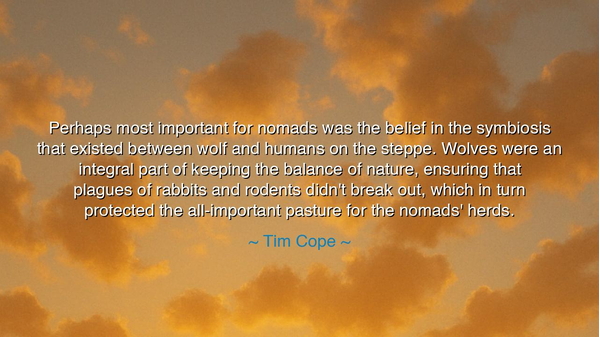
Perhaps most important for nomads was the belief in the
Perhaps most important for nomads was the belief in the symbiosis that existed between wolf and humans on the steppe. Wolves were an integral part of keeping the balance of nature, ensuring that plagues of rabbits and rodents didn't break out, which in turn protected the all-important pasture for the nomads' herds.






Tim Cope, the wanderer of the great Eurasian steppe, spoke with reverence when he wrote: “Perhaps most important for nomads was the belief in the symbiosis that existed between wolf and humans on the steppe. Wolves were an integral part of keeping the balance of nature, ensuring that plagues of rabbits and rodents didn't break out, which in turn protected the all-important pasture for the nomads' herds.” These words reveal not only a truth of ecology, but a truth of life: that survival is bound to balance, and that even the fearsome wolf, so often seen as enemy, was understood by the wise as a necessary partner in the eternal dance of nature.
The meaning of this quote rests upon the principle of symbiosis — the interdependence of all life. The nomads, who lived not in cities of stone but beneath the endless sky, could not afford to see the wolf merely as a threat. They recognized that wolves, by hunting the small creatures that bred without restraint, preserved the grasses upon which their herds fed. In this way, the wolf became not only predator but protector, ensuring that pasture — the lifeblood of nomadic existence — remained abundant. Thus, in the eyes of the nomads, wolves were not foes, but fellow guardians of the steppe.
The origin of this wisdom is ancient, born from the intimate relationship between man and land. The nomads of the steppes lived in a world where survival hinged upon harmony with nature’s rhythms. They did not write laws upon tablets, but learned them in the winds, in the migrations, in the cries of wolves at night. They knew that to kill indiscriminately was to invite imbalance, and that in destroying the wolf, one might unleash ruin upon the very herds they sought to protect. This insight — that every creature has its role — was both ecological and spiritual, a reverence born of necessity and humility.
History provides examples of this deep respect. The Mongols, who rose to build one of the largest empires the world has ever seen, carried with them a belief in the sacredness of wolves. Legends told that they themselves descended from the union of a wolf and a doe, symbols of ferocity and gentleness united. To them, the wolf was not simply an animal, but an ancestor and ally, whose strength mirrored their own resilience upon the unforgiving steppe. Their survival, and their empire, were in part rooted in this ancient understanding of symbiosis between predator and man.
Yet this wisdom is not confined to the past. In more recent times, the reintroduction of wolves to Yellowstone in America revealed the same eternal truth. Once hunted nearly to extinction, wolves returned, and their presence reshaped the land. Elk, once unchecked, moved with greater care; vegetation recovered, rivers shifted, and the balance of the ecosystem was restored. What the nomads knew through experience, modern science has confirmed: that nature’s balance is delicate, and that even the fiercest predator may be a silent guardian of life’s harmony.
The lesson for future generations is clear: do not despise what you fear, nor destroy what you do not understand. For every creature has a place in the web of life, and when one thread is severed, the whole may unravel. The nomads saw that wolves preserved the grass, the grass fed the herds, and the herds sustained the people. To forget such interdependence is to invite collapse, whether in pastureland, forest, or city. Wisdom is not conquest over nature, but alliance with her.
Practical action must follow. Look upon the world with the eyes of the nomad: seek the hidden connections between all things. Protect predators as well as prey, forests as well as fields, rivers as well as towns. Live with reverence for balance, knowing that to preserve the world is to preserve ourselves. And in human affairs, remember also that even those who seem like adversaries may serve a role we do not yet see. Harmony comes not by erasing differences, but by recognizing the interwoven purpose of all.
Thus, Tim Cope’s reflection becomes a teaching for the ages: that symbiosis is the law of survival, that the wolf is not merely an enemy but a keeper of balance, and that mankind, like all creatures, must learn to live not as conqueror, but as partner of the earth. Let this wisdom be carried forward: for to honor the wolf is to honor the pasture, to honor the pasture is to honor the herd, and to honor the herd is to honor life itself.






AAdministratorAdministrator
Welcome, honored guests. Please leave a comment, we will respond soon